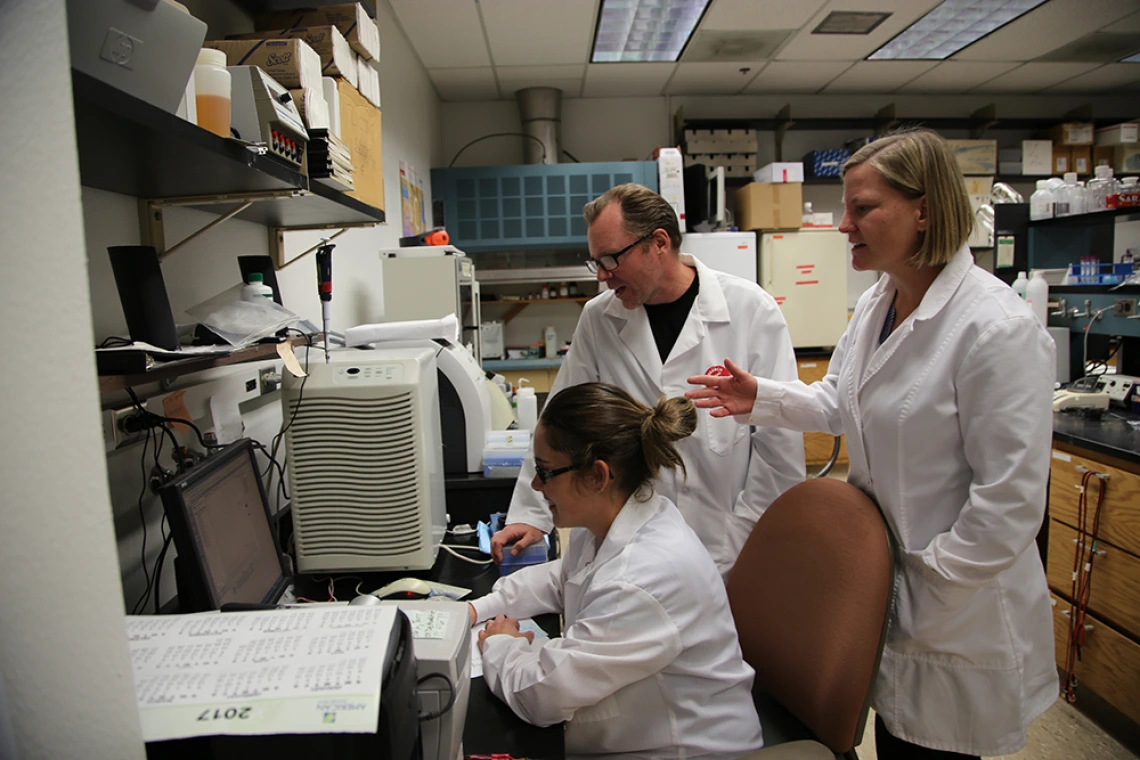Successful First Year Paves Way for Next Round of NSF I-Corps Teams

By Stuart Francis, TLA Marketing & Communications Student Writer
Bonnie Hurwitz, Ph.D., has built her career on academic research. As an assistant professor of agricultural and biosystems engineering in the College of Agriculture and Life Sciences and a BIO5(link is external) fellow, she has classes to teach, students to mentor, and her own research to move forward.
But she and co-inventor George Watts, Ph.D., research assistant professor at the Arizona Cancer Center, also have a passion for seeing that their research makes impact out in the world. To make that happen, they knew they needed to address how to commercialize their research.
“We are trained scientists. We work in the scientific method. But there’s a whole other component in the business realm that we needed to understand,” says Hurwitz. “The NSF I-Corps program got us past that activation barrier, to realize that yes, this is a priority, and this is how we can do it. It gave us the structure, the guidance, and the little push that we needed to go in the right direction and pursue the passion that we already had."
Hear about the NSF I-Corps program experience directly from Drs. Bonnie Hurwitz and George Watts. You can watch the whole video or select from the questions below.
- What brought you to the NSF I-Corps program?(link is external)
- What did you expect from I-Corps?(link is external)
- What is the greatest benefit of the I-Corps program?(link is external)
- If you could tell other researchers just one thing about the program, what would you want them to know?(link is external)
One year ago, through the work of Tech Launch Arizona, the University of Arizona was selected alongside other universities as a National Science Foundation Innovation Corps (or “NSF I-Corps”) site. In the program’s first year 30 teams of inventors and scientists like Hurwitz and Watts were able to hit the ground running towards discovering the economic plausibility and social impact of their respective inventions.
NSF I-Corps allows inventors to step outside their usual realm of academic research and immerse themselves, with the help of a closely aligned team, in the oft ambiguous world of business. During this immersion, teams find out what markets and customers might be interested in products derived from their inventions and why. However, the process to identify those appropriate markets and customers can be challenging. The I-Corps program encourages teams to talk directly with potential customers to gain a better understanding of their needs and the overall market opportunity.
“The whole template of customer discovery that’s used in the I-Corp program is just as applicable to doing your research as it is to commercializing your research outputs,” says Mary Poulton, Ph.D., another graduate of the program and director of the Lowell Institute for Mineral Resources. “The notion of getting out of your office and talking to people is just as important to doing a good research proposal as it is to commercializing a product.”
Tech Launch Arizona helps bring cross-functional teams together, organizing each one around specific technologies to maximize the benefits that the I-Corps program will have in helping them bring the intellectual property to market. These teams, comprised of a principal investigator, entrepreneurial lead, and a business mentor, work collectively to break down the stories of their complex technologies into brief understandable customer pitches.
This past year, TLA successfully reached their goal of putting 30 teams through the program, which the office offered through four separate cohorts. Each team receives a grant of up to $3,000 dollars, which they use for customer discovery. Then, leveraging what they glean from those interviews, they further articulate their business concepts and strategies, and ultimately make a go or no-go decision about moving their startup forward.
When asked about the series of classes, Eric Smith, Commercialization Network Manager at TLA says, “We walk the teams through how to go through their own customer discovery process and give them the skills and information to succeed.”
Examples of the teams that worked with TLA and I-Corps this past year include:
- Ph.D. students in Dr. Victor Hruby’s lab in the Department of Chemistry and Biochemistry, who worked on commercializing a drug candidate to treat neurological disorders. (Watch video.)(link is external)
- Roger Dahlgran, Ph.D., in the College of Agriculture and Life Sciences, who used an I-Corps grant to discover customers for their HedgeSmart software. (Watch video.)(link is external)
- Jacob Schwartz, Ph.D., also in the Department of Chemistry and Biochemistry, whose team is developing a new diagnostic for ALS. (Watch video.)(link is external)
- Mary Poulton, Ph.D., who was part of a team investigating the market for using their video games to do safety training for people who work in mines. (Watch video.)(link is external)
These teams and many others have benefitted from the plethora of resources and partnerships that TLA brings to the table. For example, the McGuire Center for Entrepreneurship provides hands-on support through invaluable, knowledgeable lecturers for I-Corps classes. Past I-Corps faculty have included programs director for the McGuire Center Joe Broschack, and adjunct lecturer at the Eller College Rick Yngve.
According to Hurwitz, “I-Corps provided us the ability to take our application and break it down in such a way that was understandable. We could then use it to talk with potential clients that may use our product and start to understand what their needs are and how we can improve our product and get it to market.”
Tech Launch Arizona is accepting applications for future NSF I-Corps cohorts. Interested inventors, entrepreneurs and potential mentors should contact Samantha Bares at samanthab@tla.arizona.edu(link sends e-mail).

